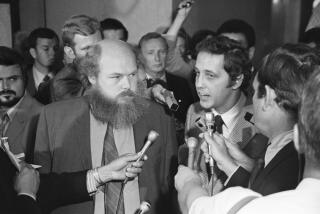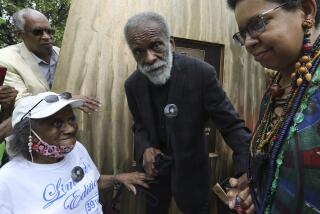BBC Trial Traces Maze of ‘Paradox Philosophy’
- Share via
Like most everything in the murder trial of Billionaire Boys Club founder Joe Hunt, the example that ex-members use to illustrate the group’s philosophy has an elegant setting, a novel point of view and a touch of Hollywood:
It takes place in the cavernous, lavishly appointed conference room of the West Hollywood offices of BBC Consolidated Inc. of North America. Leader Hunt is showing a videotape of the movie “Rambo: First Blood,” and has challenged his followers to “pick out the place at which Rambo loses his advantage.”
“Nobody could figure it out,” Tom May, 27, son of the former chairman of the May Co. department store chain, recalled when he testified in Santa Monica Superior Court last week.
So Hunt rewound the tape to what he saw as the crucial moment. As recounted by Jeff Raymond, another former member, that moment comes when the fleeing hero encounters a young boy in the forest. Rambo cannot bring himself to slit the child’s throat. The boy screams, giving away Rambo’s whereabouts.
“Hunt said that this innocent child should have been killed,” May said.
“Survival is the key thing,” explained Raymond, 26, son of a noted metallurgist.
The smart person is the one who would cut the throat? asked prosecutor Fred Wapner.
“Yes, that was my impression,” Raymond replied.
Hunt’s survival is at stake now. He is on trial for the murder of Ron Levin, a Beverly Hills con man who disappeared June 6, 1984, and whose body never has been found. If convicted, the 27-year-old Hunt could be sentenced to death.
Three key members of the BBC testified last month that at a special meeting of select followers in the summer of 1984, Hunt announced, “Jim and I knocked off Ron Levin.” (“Jim” is a reference to Hunt’s bodyguard, Jim Pittman, who faces a separate trial).
Prosecutors allege that the pair killed Levin to get even for his having duped Hunt in a fake commodities trading scheme and to get money for the BBC’s troubled businesses.
But to understand why Hunt’s followers believed his boast, why they were not shocked by it, and why they still regarded him as “a great man,” Wapner said, it is necessary to understand “the philosophy that bound this group together and is integral in understanding the actions of the defendant.”
Hunt called it “paradox philosophy.”
“Paradox philosophy was simply a tool Mr. Hunt used--along with his rhetorical skills--to persuade people that whatever he wanted them to do was correct,” said ex-member Evan Dicker, 26, grandson of the founder of the prestigious Westside law firm of Dicker & Dicker.
It had its own vocabulary: there were “shadings,” “normies,” “cells,” “nexuses,” a “thorax” and even a “paradox court.” But stripped of its jargon, it sounded a lot like situation ethics, in which good and bad are relative--not absolute--concepts, interchangeable according to the circumstances and one’s perspective.
“Black is white, and white is black, and all the shadings in between,” goes one catch phrase, explained by one member to mean that something can be true and false, good or bad, at the same time: “You can look at any situation and change it around.” Another said he thought it meant that “the end justifies the means.”
Coming from the mouth of the charismatic Hunt, once a gangly debating star at prestigious Harvard School in Studio City, paradox philosophy sounded new and made sense to the young men from the Westside who gathered around him, dubbing themselves the “Billionaire Boys Club.”
And it enabled them to feel that they were outside, above, society’s rules.
“I started being less obligated to follow rules and doing more what was acceptable under the circumstances,” said Dicker. “You don’t blindly follow any rule--whether it’s laws, religion or social norms.”
Those who best understood and followed paradox philosophy were designated by Hunt as “shadings.” The shadings included Hunt, Dean Karny and Ben Dosti. (Karny is now the state’s star witness. Dosti, son of a Times food writer, is charged, with Hunt and two others, in a second murder in Northern California).
“After Joe lost all my money,” said May, who with his twin brother, Dave, lost $180,000 to the BBC’s bad investments and high living, “(Hunt) said, ‘because you’re taking this so well I’ll make you a shading.’ ”
“A shading could take a situation and color it to suit what he wanted,” said Dicker, who never made it to shading status. “A shading is someone fully guided by paradox philosophy, which means you throw off all constraints society might have placed on you and rules that may not be applicable to you but still blindly applied.”
The philosophy was also supposed to guide the running of the BBC’s myriad subsidiaries. Members would not be salaried employees but participants in a joint venture. They would subordinate themselves to Hunt and the corporation in order to become financially successful--and in the long run they would be handsomely rewarded in direct proportion to their efforts.
“Hunt said that to achieve or hold on to great wealth you must sometimes transgress the law,” Dicker testified, adding that as BBC secretary he falsified business records at Hunt’s direction and witnessed others trying to forge signatures.
Would paradox philosophy also justify a murder? he was asked. “I think it is within paradox philosophy that it would, yes,” said Dicker.
But the same philosophy could also explain Hunt’s claiming to have killed Levin, the defense contends. “Hunt would have said anything to these witnesses to maintain his status within the BBC and in their eyes and to remain the leader,” said his lawyer, Arthur Barens, pointing out that they revered him even after he confided what he had claimed to have done.
“He seemed like an eagle returning to the nest. . . . He certainly didn’t seem to be ashamed,” said Dicker. “It (telling he had killed) didn’t hurt his stature. It seemed like he had done this for us.”
At the time of the alleged murder, the BBC had only enough money to survive for two more months; Hunt accompanied the announcement that he had killed Levin with news that, before his demise, the victim had been forced to write a check for $1.5 million payable to a BBC subsidiary, Microgenesis, according to Raymond’s testimony.
Asked why he was not shocked at Hunt’s talk of having killed Levin and disposed of his body with acid, Dicker said: “At that time it evoked no emotional response. The paradox philosophy had reached a point in my life when I didn’t have an emotional reaction, there was nothing in my stomach that knotted up.”
He said he did express disgust at Hunt’s statement that his cotton topcoat, which he had left behind at a party at Dicker’s house shortly after the alleged murder, had “had Ron Levin’s brains smeared on it.” But he said Hunt assured him it had been dry-cleaned.
In fact, he said, had Levin suddenly appeared on the scene, “that would have diminished Joe’s credibility.” And he said that if Hunt had told the group he had lied, his status in the group could have fallen, too, depending on his reasons.
Dicker testified that Hunt later discussed the possibility of killing Jeff Raymond’s girlfriend and somehow pinning both her murder and that of Levin on Raymond. Hunt also suggested killing the May brothers when he found out that they were in touch with Beverly Hills police in the fall of 1984. Hunt entered their apartment while they were on a business trip and listened to incoming messages on their answering machine, Dicker testified.
Raymond and the Mays went to the police in August, about six weeks after Hunt made his surprise announcement and indicated that the BBC was about to take further “bold steps.” Dicker contacted authorities in December.
After several days of testimony that included discussions of Camus and Sartre, the myth of Prometheus, buying commodities on margin, silica-grinding machines that weigh as much as elephants and the best way to dispose of dead bodies, co-defense counsel Richard Chier shook his head.
“You can’t determine what’s true and not true” from the testimony so far, he said. “It’s a question of the kids saying, ‘I was mesmerized then, but now I’m OK.’ I know everything (Hunt said) was false, except the murder, which was true.”
More to Read
Inside the business of entertainment
The Wide Shot brings you news, analysis and insights on everything from streaming wars to production — and what it all means for the future.
You may occasionally receive promotional content from the Los Angeles Times.










